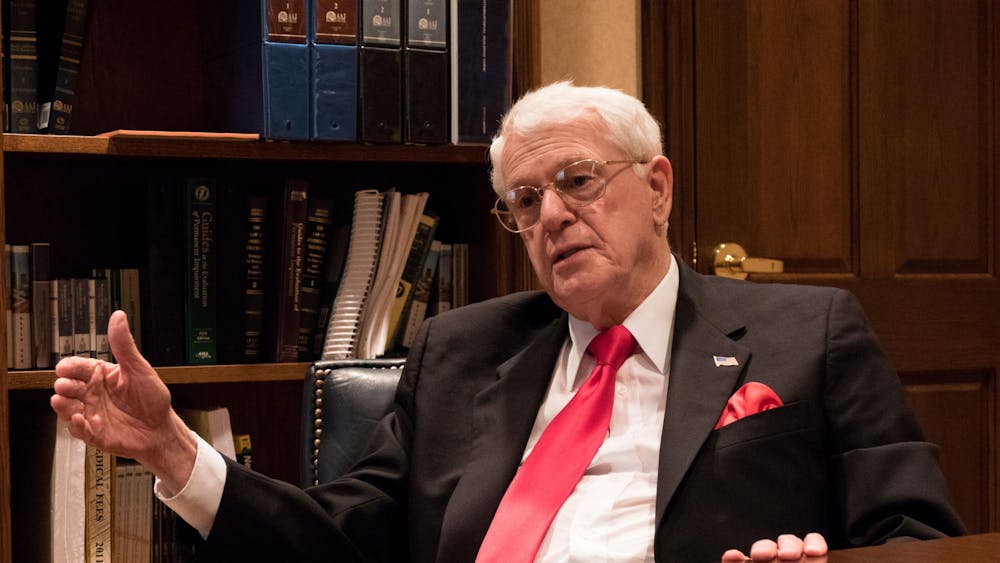Graduate students at IU have experienced higher tuition costs and face greater debt when leaving the University, as state funds for higher education have withered away over the past decade. \nWith the upcoming Nov. 7 elections, many are questioning how politics and government spending can affect graduate students. \nThe funding slash in large part has caused expected debt to surge among graduate students by more than 250 percent during the past decade and has made competition to become student academic appointees -- teaching assistants, assistant instructors and research assistants who are paid part or all of their tuition -- more fierce. \nWith higher education allowances dissolving, graduate students at IU have especially been affected. Tuition has doubled in some graduate programs during the past decade. In 1996, Indiana residents could expect to pay $7,800 per year in tuition to earn a Masters of Business Administration degree. Today, tuition for the same degree surpasses $14,000, according to the IU Factbook. \nPatrick Bauer, D-South Bend, the Indiana House of Representative Democratic leader, said the only way to reverse this trend was if the people demanded a change.\n"It depends on whether people in the higher education community realize (the funding) has slipped," he said. "Now the only way to help that is to raise tuition -- and we don't want that in Indiana. We want to make it affordable."\nAcross the aisle, Republicans who hope to retain control of the House and the Senate disagree with Bauer's calls for higher education funding. \n"When the Democrats were in control, we had overspending every year. When Gov. (Mitch) Daniels entered office, the state was in $1 billion in debt because of failed Democratic leadership over the past seven or eight years that robbed nearly every account out there," said Rep. Bob Behning, R-Indianapolis, chairman of the House Education Committee in the Indiana House of Representatives.\nAlong with the skyward rise in tuition, graduate students also saw a pinch in tuition-deferring opportunities. \nThough each of the University's graduate schools offer some employment program aimed at helping offset tuition costs, some reach further than others. Currently, the College of Arts and Sciences employs the most graduate students with 1,825 serving as student academic appointees -- down about 200 from 2004, according to information gathered by the Office for Academic Personnel Policies and Services. \nSince the General Assembly started actively deflating University funds almost a decade ago in hopes of leveling off the growing state deficit, only about 30 percent of graduate students have served as appointed student employees. \nPaul Rohwer, moderator of the Graduate and Professional Student Organization, said higher education funding is one of the issues that could influence the way students vote. He said it seems the Democrats have really worked to make education their primary platforms but added they failed to reach out enough to student voters.\nAvraham Spechler, School of Education representative to the GPSO, said that no shift in concessions would be seen until both citizens and legislators felt an increase in funds could directly boost the state, adding this was an issue a single election could not resolve. \n"If you're a Hoosier who has lived here for a number of years, how are these higher education services going to help you? And how are these graduate students who will most likely leave the state anyway going to help you?" he said. "It's going to take a shift in the political constellation. It is going to take a shift in the economic base that can support these more educated workers." \nSince 1975, IU's portion of the state's general operating budget has dropped more than 3 percent, according to information from the IU Office of Government Relations. Though damaging to public universities throughout the state, other areas under current allocations have flourished. Medicaid funding skyrocketed 40 percent since 2000 and funding growth for the state correctional and public safety systems doubled that of higher education, according to the IU Office of Government Relations. \nWithin the University, areas like financial aid programs for graduate students have endured the most brutal cutbacks, while other sectors remain less affected. Full professors, for instance, have seen a 22 percent hike in salaries since 2000 -- increasing the average wage to more than $130,000 per year, according to the IU Factbook. \n"Getting professors is becoming a very competitive element to higher education," said Debbie Sibbitt, director of Hoosiers for Higher Education, an advocacy group that works to lobby public officials on higher education funding. "If you look at all of these baby boomers getting ready to retire, there is not nearly the influx to support all of those baby boomers who will be leaving those positions. This makes it a truly competitive venue."\nAs elections inch closer each day, some students and staff have spoken against what they believe to be detrimental behavior toward Indiana's economic future. Sibbitt said the outlook of this issue rests upon voter results. \n"It's going to depend on Nov. 7. That is what is going to make a determination about what happens," she said. "Both legislative areas -- the (state) House and the Senate -- are both Republican now, and that could very easily change things if the House especially goes Democrat"
Election could impact graduate student debt
Fewer opportunities for funding open as financial support from state falls
Get stories like this in your inbox
Subscribe





